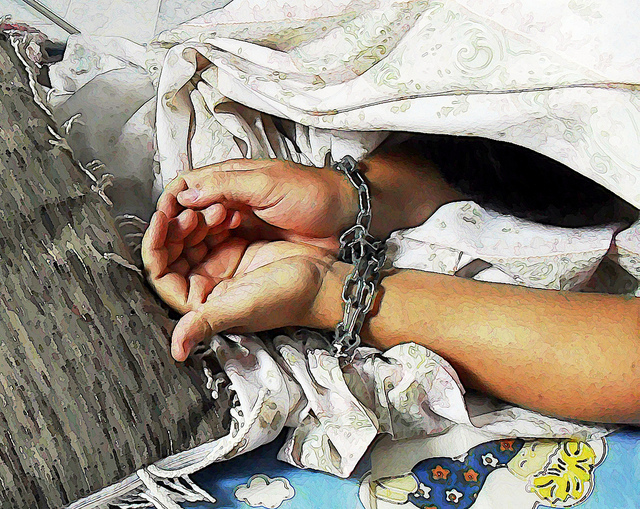
Jun 30, 2022
The trafficking of agriculture workers, including children, is widespread globally, and “practices of exceptionalism” limit workers’ rights to freedom of association, organizing and collective bargaining, according to a new report on trafficking in persons in agriculture from United Nations Special Rapporteur Siobhán Mullally.
“Characterized by high levels of informality, lack of oversight and protection, trafficking in persons remains a serious concern within the agricultural sector, affecting both adults and children,” she writes.
The report notes that while the COVID-19 pandemic saw agricultural workers designated as “essential,” worker protections did not follow. Indeed, temporary, seasonal and migrant workers are provided limited legal coverage, and restrictive migration policies persist despite the demand for agricultural workers.
Findings include:
- Discrimination on the grounds of race, ethnicity, migration status, disability creates conditions within which trafficking occurs with impunity.
- Land inequality, particularly affecting women and girls, drives exploitation, including trafficking for forced labor.
- The agriculture sector employs an estimated 28 percent of the total global labor force and an estimated 60 percent of the labor force in low-income countries. Because it is characterized by high levels of informal and seasonal employment, the risks of exploitation are also high.
- Discrimination based on migration status leaves workers vulnerable to trafficking.
- Inequality in land ownership and tenure contributes to poverty, dependency and risks of violence, including trafficking of women and girls. Women are estimated to make up 20 percent of the world’s landholders but account for 43 percent of agricultural workers.
- Indigenous women and girls may experience increased risks of trafficking due to the intersection of discrimination and violence, based on race, ethnicity, indigenous origin and poverty.
- People with disabilities may be particularly at risk of trafficking in agricultural work, where there is limited oversight and monitoring of worker rights.
- Agriculture is the entry point for child labor, accounting for 76.6 percent in child laborers ages 5-11 and 75.8 percent in children ages 12-14. Children who travel with parents migrating for work often miss out on their education, as well.
The Special Rapporteur also highlighted that recruitment practices for the sector–particularly of seasonal, temporary and migrant workers–increase risks of trafficking for forced labor. Recruitment processes and substantial recruitment and other fees often lead to debt bondage.
Meanwhile, “intensive agriculture and agribusinesses contribute negatively to climate change, reflecting the wider nexus between trafficking in persons, environmental degradation, loss of biodiversity and the climate crisis,” she writes.
The protection of all workers and their families “is essential to prevent trafficking,” she says, urging governments to, among other urgent actions: “Strengthen the capacity of trade unions, civil society organizations and human rights defenders to support agricultural workers, including through effective protection of rights to freedom of association and peaceful assembly and to collective organizing and collective bargaining, without discrimination.”
The Special Rapporteur’s report was bolstered by a submission from the Solidarity Center related to the conditions for migrant workers in Jordan’s agriculture sector. The submission noted:
Migrant workers work very long hours in hazardous conditions that lack occupational, safety and health (OSH) standards, medical care and overtime compensation. Forced overtime is an indicator of forced labor under ILO standards. The agricultural sector in general is an informal economy sector, and the work is usually temporary or seasonal. Agricultural areas are isolated and far from service centers; therefore, agricultural workers who suffer from labor and human rights violations do not have access to justice. Forced labor and wage theft are common violations, although usually not reported because of limited access to justice, absence of labor inspection and fears of retaliation and other threats workers face, especially undocumented or irregular workers. Because these workers were not recognized as workers under Jordanian labor law until May 2021, they lacked access to labor courts and were forced to file complaints through civil courts, which do not exempt court fees, making this an inaccessible complaint process for agricultural workers.
The kafala system requires migrant workers to be fully reliant on their employers for legal status. In the case that an employer does not renew a work permit, the worker is punished with deportation and a ban from returning to Jordan for three years. Workers are often deported without receiving their owed wages and other compensation–a form of wage theft, which is also an ILO indicator of forced labor. In cases where agricultural workers leave a workplace to escape harassment, rights violations and forced labor without reporting such violations, they are subject to an overstay fine, which is 1.5 Jordanian dinars per day (approximately $2) and they are subject to detention and false or retaliatory theft accusations by their employers, essentially becoming undocumented workers. Migrant workers rarely if ever report violations, fearing employer harassment or retaliation. Undocumented workers are victims of exploitation by brokers and fixers who charge excessive fees for work permits. A Syrian woman worker said, “Syrian agricultural workers’ wages are the lowest not because they accept to work for low wages but because the shaweesh (the middleman) takes a percentage of their wages.”
The Special Rapporteur’s report cited these examples and supported the Solidarity Center’s conclusion in its submission: “Trade unions are important to combat forced labor and other forms of labor trafficking and exploitation, and to raise workers’ awareness about their rights and the available services and access to justice channels.
“The explicit exclusion of both migrant workers and workers in the agricultural sector is a violation of these workers’ fundamental right to freedom of association under the Constitution of Jordan and international human and labor rights as enshrined in the ICCPR, ICESCR and ILO Conventions 87 and 98. The right to freedom of association is fundamental in a workers’ ability to advocate for her/his own rights, protect themselves from forced labor, and ensure protections from GBVH, and other occupational hazards.”
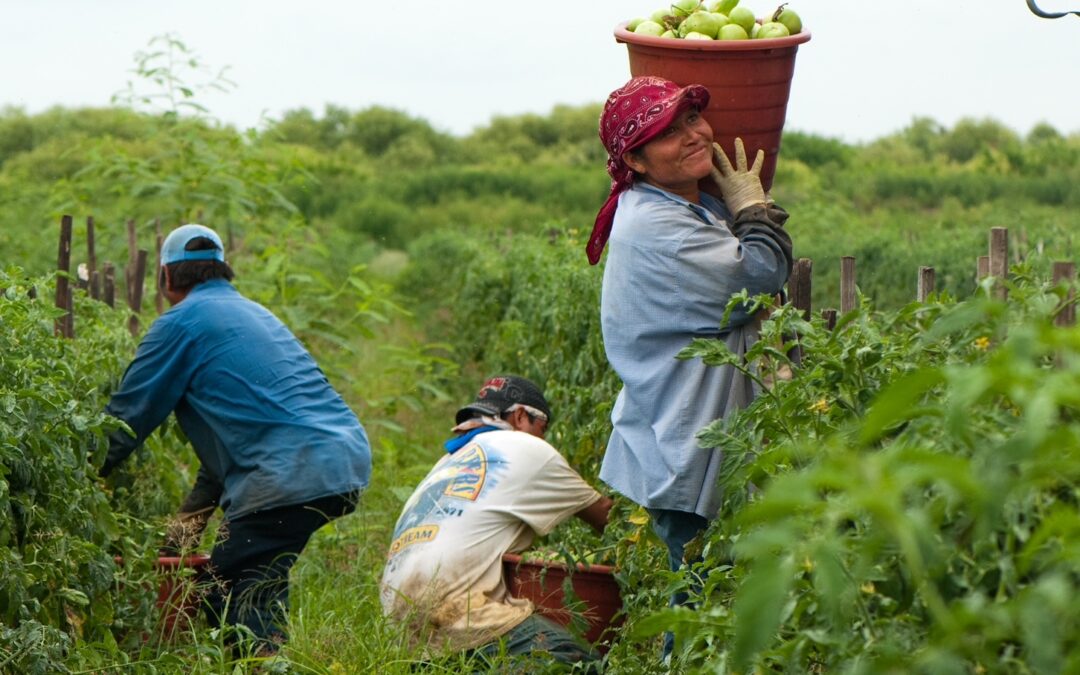
Jun 24, 2022
A significant number of migrant workers worldwide are not paid for work performed, and legal remedies to recover them are few. But new policies have proven effective in ensuring migrant workers are treated fairly, a global panel of experts said yesterday.
“Paying workers their wages in full and on time is the basic bargain in employment relationships—when someone works, they do so in exchange for payment from an employer. Yet, for many of the 169 million migrant workers around the world this is not their experience,” said Neha Misra, Solidarity Center global lead on migration and human trafficking. “This is not a simple issue of wage arrears, like a clerical error. This is THEFT.”
Misra co-moderated Innovative Strategies for Improving Migrant Workers Access to Justice for Wage Theft, a panel bringing together migrant worker advocates from Australia, Canada, Colombia and the United States to share promising practices championed by labor and migrant worker rights advocates and adopted by governments and employers. Jeff Vogt, director of the International Lawyers Assisting Workers (ILAW) Network, was co-moderator.
“We need to educate and motivate governments to take action to remedy wage theft, including in supply chains,” said Laurie Berg, co-executive director of the Migrant Justice Institute which, along with Solidarity Center and ILAW, a Solidarity Center project, sponsored the event.
Freedom to Form Unions Key to Ending Wage Theft
 Few migrant workers are covered by labor laws, and an overarching solution to the scourge of wage theft is for governments to provide migrant workers access to these fundamental protections—and that includes the ability to freely form unions, an internationally recognized right that most governments refuse to extend to migrant workers.
Few migrant workers are covered by labor laws, and an overarching solution to the scourge of wage theft is for governments to provide migrant workers access to these fundamental protections—and that includes the ability to freely form unions, an internationally recognized right that most governments refuse to extend to migrant workers.
Speaking on the panel, Bassina Farbenblum, Migrant Justice Institute co-executive director, ourlined additional concrete measures to address wage theft, drawing on examples undertaken in cities and countries around the world. These include shifting the burden of proof to employers in wage claims—such as requiring the employer to demonstrate it paid the worker correctly—to establishing financial repercussions for employers who withhold wages or ignore judgments favorable to workers. Migrant workers often fear deportation or other forms of employer retaliation if they file wage claims, said Farbenblum. Solutions include allowing migrant workers to change employers without losing their visa, and allowing them to file claims after they leave their job — by permitting temporary stay in the country to pursue wage claims or enabling them to file claims from their origin country.
Berg and Farbenblum detail these and more options in Migrant Workers’ Access to Justice for Wage Theft: A Global Study of Promising Initiatives, a 2021 study undertaken in partnership with Solidarity Center and ILAW. The report supports a new initiative coordinated in part by the Solidarity Center, the Migrant Worker Access to Justice for Wage Theft campaign, a global coalition working to provide remedy and accountability for wage theft.
The project launches a new phase in September, with the formation of a community of practice that will develop policy guides on reform targets to enable advocates to push for law and policy reform, said Berg. The guide will set out a variety of models and examples where reform has been implemented.
Canada, Colombia Examples to End Wage Theft
Panelists Amanda Aziz, a lawyer at the Migrant Workers Center in Canada, and Angélica Palacios Martínez at the Solidarity Center in Colombia, detailed specific initiatives in their countries to end wage theft.
In Canada, where migrant workers’ work visas are tied to specific employers in temporary migration schemes, rights advocates campaigned to establish an open work permit program in 2019 that applies to vulnerable workers with valid permits. The ability to move freely to another job allows them to escape abusive work situations, said Aziz. Similar systems in which migrant worker visas are valid only for one employer, such as the kafala sponsorship system in Arabian Gulf countries that ties migrant workers to their employers and guestworker programs in the United States that do the same, effectively deny migrant workers fundamental rights and fuels abuse like wage theft.
Martínez described how the recent influx of Venezuelan migrant workers to Colombia makes it easy for employers to exploit a vulnerable workforce. Many seek jobs through platform delivery companies such as Rappi, which effectively tells workers if they do not like conditions, they can leave because other workers will take their jobs, she said. While Colombian workers in the formal sector work up to 48 hours a week, migrant workers must work far more because they are paid so little, she said.
The workers formed a union, UNIDAPP, and took their demands for decent work to the labor minister. They also won a court decision that forced Rappi to pay wages they owed workers.
“We’re looking for equality of the treatment of all workers in the country,” Martínez said.
Also speaking on the panel, Ruth Silver-Taube at the Santa Clara University School of Law described how advocacy efforts of a wage theft coalition won a series of victories that included barring governments in Santa Clara County, San Jose, and other nearby cities from contracting with employers who have outstanding wage theft judgments.
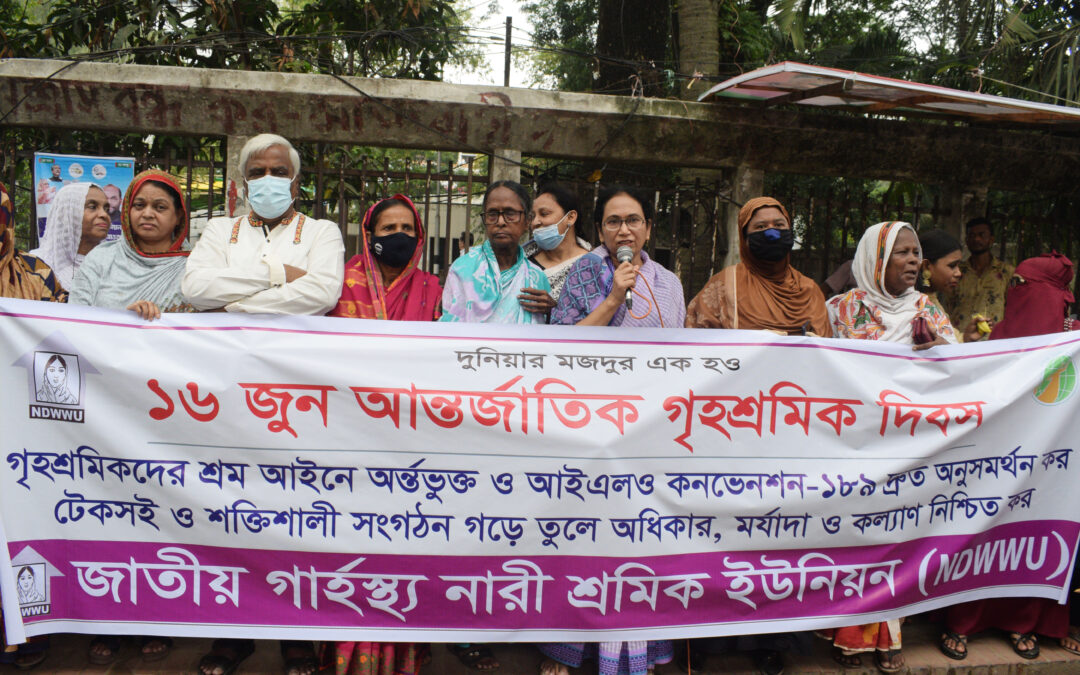
Jun 22, 2022
Demanding the ratification of International Labor Organization (ILO) Convention 189, Decent Work for Domestic Workers, leaders and members of the National Domestic Women Workers Union (NDWWU) on June 16, 2022, rallied in front of the National Press Club in Bangladesh to mark International Domestic Workers Day.
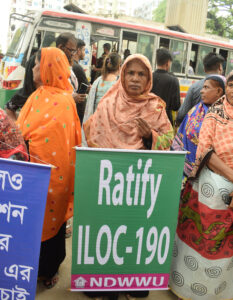
They also demanded the ratification of International Labor Organization (ILO) Convention on violence and harassment in the world of work (ILO C190). A Bangladesh Institute of Labor Studies (BILS) report says 12 domestic workers were raped in 2020.
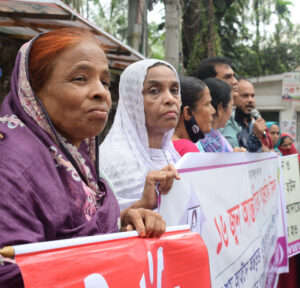
Although Bangladesh presided over the 100th session of the International Labor Conference and voted for ILO C189, the country’s domestic workers still are not protected by the global treaty because the government has yet to ratify it.
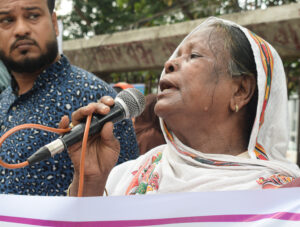
When Sitara Begum, 60, approached law enforcement after being harassed at her job as a domestic worker they did not assist her, and she was forced to flee from her employer. “In 22 years of working as a house help, I had to endure many such incidents. When does our agony stop?” she asks.
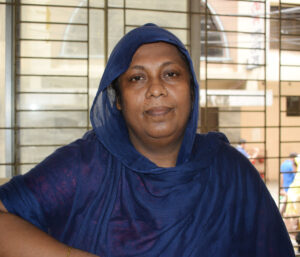
Domestic worker Rehana Akter Mita, 37, her family’s only breadwinner, earns $96.59 per month, which does not cover living expenses. Mita often takes loans from relatives to support her son’s education and husband’s medical costs.
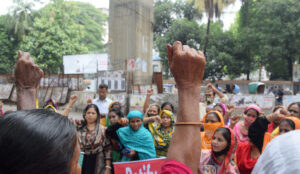
The 2006 Bangladesh Labor Act does not recognize domestic worker rights. Domestic workers and their unions are urging the government to ratify ILO C189, a global treaty ensuring domestic workers their rights on the job.
Photos: Solidarity Center/Amir Hasan Shahriar
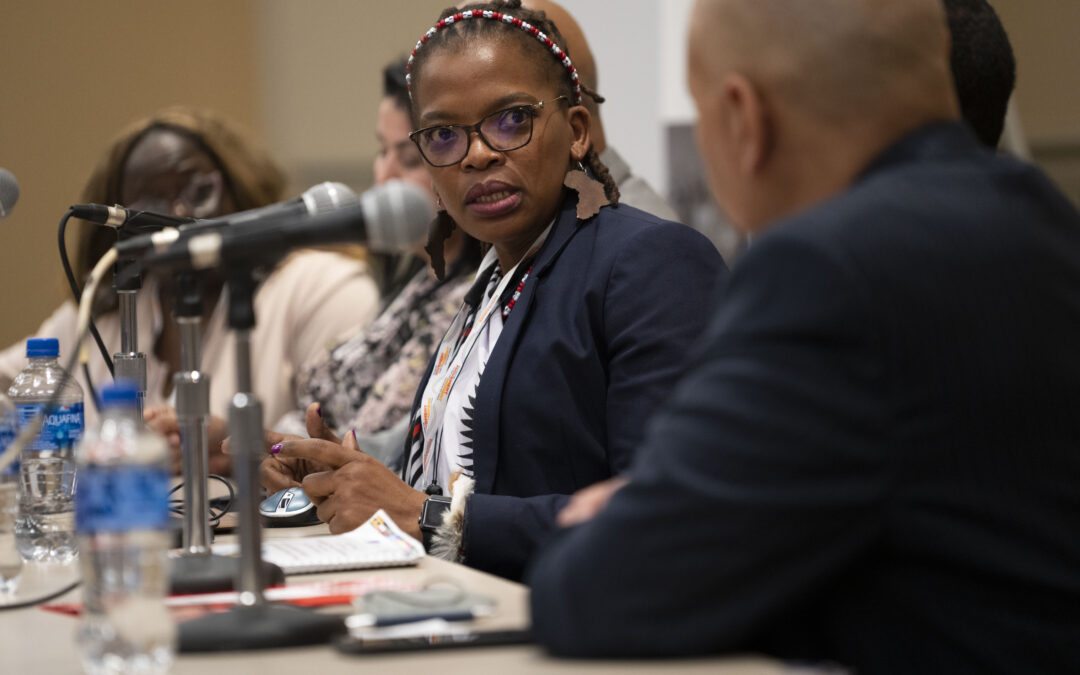
Jun 17, 2022
The Global Organizing Symposium, a daylong side event of the AFL-CIO Convention, brought together workers and activists from around the world to share experiences focused on building collective power for workers post-pandemic and highlighted their role in fighting authoritarianism and bolstering democracy. Sessions focused on platform worker rights, clean-energy models that both address climate change and work for workers and building a movement racial equality.
In the first session, panelists shared how gig workers in the platform economy are organizing globally to create decent work in a sector notorious for low-balling pay and denying rights and benefits.
As the pandemic took hold two years ago, app-based delivery workers in Mexico—like their counterparts around the world—encountered increasingly dangerous working conditions. When one worker was killed on the job and the company did nothing, they knew the only way to protect themselves and their livelihoods was to join in common cause.
The workers formed a colectivo they called Ni Un Repartidor Menos (Not One Delivery Worker Less) to address egregious and life-threatening job hazards, among them sexual harassment, violence, injuries fatal and less so, as well as unfair laws that have levied onerous taxes on wages and for the use of infrastructure, like sidewalks.
Saúl Gómez, founder of Ni Un Repartidor Menos, told a gathering of almost 300 union activists convened ahead of the AFL-CIO Convention for the Global Organizing Symposium last weekend that the app company cares little about the workers, and customers can act with impunity toward delivery people. Women workers, in particular, face inappropriate behavior and additional safety risks. For example, Gómez said it was not unusual for naked customers to receive deliveries. Even worse: One woman worker delivering to a residence in one of Mexico City’s toniest neighborhoods, Polanco, was held captive by the customer for nearly a week.
The customer suffered no consequences. The worker was fired when the company removed her from the app.
Defending Democracy and Hard-Won Rights
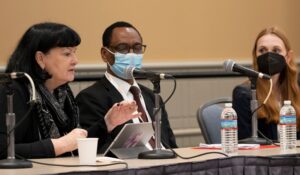
ITUC General Secretary Sharan Burrow discusses the erosion of democracy with Kassahun Follo Amenu from Ethiopia and Olesia Briazgunova from Ukraine. Credit: Jay Mallin
Speakers pointed to the erosion of democracy in their country and ways the labor movement is working to turn the tide. Nowhere is the conflict between authoritarianism and freedom more in the spotlight than Ukraine.
“We are paying a big price for independence,” said Olesia Briazgunova, international director of the Confederation of Free Trade Unions of Ukraine. Among the thousands of Ukrainians defending their country are union members, while other unionists are “dodging bullets and shelling to deliver humanitarian aid.
“At the same time, we are following situations in other countries like Myanmar, Belarus and Hong Kong, and every threat that spreads evil in the world.”
Tunisia, meanwhile, is going through an economic, financial, social and institutional crisis, and “conditions are deteriorating with the inability of the elite to develop democratic institutions,” said Hedia Arfaoui, deputy secretary general of the Tunisian General Labor Union (UGTT). Youth are especially disillusioned, she added, with little hope for employment or a reduction in the poverty rate.
Many Tunisians are concerned that the democracy gains made following the 2011 revolution—especially those made by women, including full equality under a new constitution—will be dismantled. Tunisian President Kais Saied, who is currently ruling by decree, has said he will replace the 2014 constitution. Hundreds of thousands of UGTT members took part in a general strike June 16.
“Women’s rights are an integral part of the human rights system. And Tunisian women and trade unionists are aware of the danger of rollbacks of all they have won,” she said.
In Ethiopia, where politics are based on ethnic groups and a divisive war continues, the Confederation of Ethiopian Trade Unions (CETU) promotes inclusion, peace and dialogue, said CETU President Kassahun Follo. As the largest multi-ethnic, civil society organization in the country, the union focuses on common goals, “uniting on workplace issues and labor rights,” he said. Since October 2021, CETU has organized 30,000 workers.
“There are no human rights, no labor rights without democracy. And today, fewer than 20 percent of people live in truly free countries,” highlighted Sharan Burrow, general secretary of the International Trade Union Confederation. “We can only ensure peace and democracy through justice.”
Participants also expressed concern over the situation in Hong Kong and pledged support to working people and unions in Hong Kong who are under severe pressure.
Workers, Unions and Climate Change
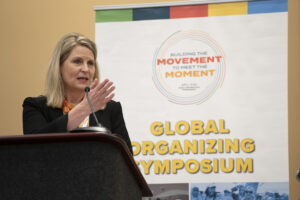
AFL-CIO President Liz Shuler engaged with participants at the AFL-CIO global side event. Credit: Jay Mallin
Lebogang Mulaisi, labor market policy coordinator of the Congress of South African Trade Unions (COSATU), said that very early on, COSATU recognized that “climate issues are workers’ issues,” and COSATU’s work to bring about a just transition is based on three principles: distributed justice, procedural justice and restorative justice. The first ensures the benefits and burdens of what is a very disruptive process be distributed. Procedural justice means everyone affected is involved in determining the rules that guide the transition. And with restorative justice, vulnerable populations most affected by unemployment and inequality—among them women and youth—are both participants and beneficiaries.
“It will take strong unions to bring about a just transition,” she said.
In Brazil, efforts to move toward the use of renewable energy are a challenge not least because democracy there is under threat, said Quintino Severo, deputy international affairs secretary of CUT Brazil. “A great challenge is to make sure all the rights we have won are respected,” he said. “Clean energy isn’t clean if it’s tainted by the blood of workers.”
Highlights of the event included keynote speeches by Liz Shuler, AFL-CIO president, and Uzra Zeya, U.S. under secretary for civilian security, democracy and human rights.
Cathy Feingold, AFL-CIO international director, moderated the symposium. Other speakers discussing organizing and democracy in the U.S. and European contexts were: Stuart Applebaum, president of the Retail, Wholesale and Department Store Union (RWDSU); Roxanne Brown, international vice president, United Steelworkers; Stephen Cotton, general secretary, International Transport Workers Federation; Atle Høie, general secretary, IndustriALL; Zingiswa Losi, president, COSATU; Biju Mathew, president, International Alliance of App-Based Transport Workers, Terrence Melvin, secretary-treasurer, New York State AFL-CIO; and Ashwini Sukthankar, director of global campaigns, Unite HERE.

Jun 16, 2022
Hundreds of thousands of public employees across Tunisia waged a one-day strike today after talks with the government failed to address the rising cost of living and sinking wages, even as it increases taxes and cuts social programs.
“The strike on June 16, 2022, is an opportunity for workers to affirm their unity, hold on to their rights, and defy the usurpation and threats, including unconstitutional and illegal burdens,” the Tunisia General Labor Union (UGTT) says in a statement.
At least 96 percent of public employees from 159 state institutions and public companies took part in the strike, according to the UGTT, which says the strike enabled workers “to express their anger at the deterioration of their working and economic conditions, the low wages and the threat to their livelihoods.” The UGTT, which represents nearly 1 million workers, says the government is “undermining the principle of negotiation and backtracking on previously agreed deals.”
Flights were cancelled as members of the Transport General union observed the strike. In Tunis, the capital, striking workers rallied at the UGTT building where they staged a sit-down strike, waving signs, “Do not neglect public institutions!” and “I love the country!” Members of organizations such as the Tunisian League for the Defense of Human Rights, Democratic Women, and the Economic Forum turned out to support striking workers.
Government Bailout at Workers’ Expense

Tunisian workers rallied at the UGTT building during the one-day general strike. Credit: Montasar Akremi / UGTT
The government is seeking a $4 billion loan from the International Monetary Fund (IMF) in exchange for cuts in food and energy subsidies, wage freezes and privatization of state-owned enterprises.
The UGTT has rejected proposed spending cuts and, with year-over-year inflation at 7.8 percent in May, is seeking wage increases for public-sector workers. UGTT also is demanding that state-owned companies, including electricity and fuel, not be privatized and wants the government to adhere to a December 2021 agreement in which it will negotiate with unions on policies affecting workers. UGTT also is calling for the immediate, case-by-case review and reform of public institutions.
“The current government is determined to make [workers] bear the consequences of its choices,” UGTT says, citing the current and previous governments’ failure to address its financial crisis.
Global union organizations are backing the UGTT in its efforts to end the impasse with the government, with the AFL-CIO, the European Trade Union Confederation, IndustriALL and others sending letters of support.
UGTT’s last general strike in 2018 was part of a weeks-long wave of mass actions that resulted in a salary increase for public employees.
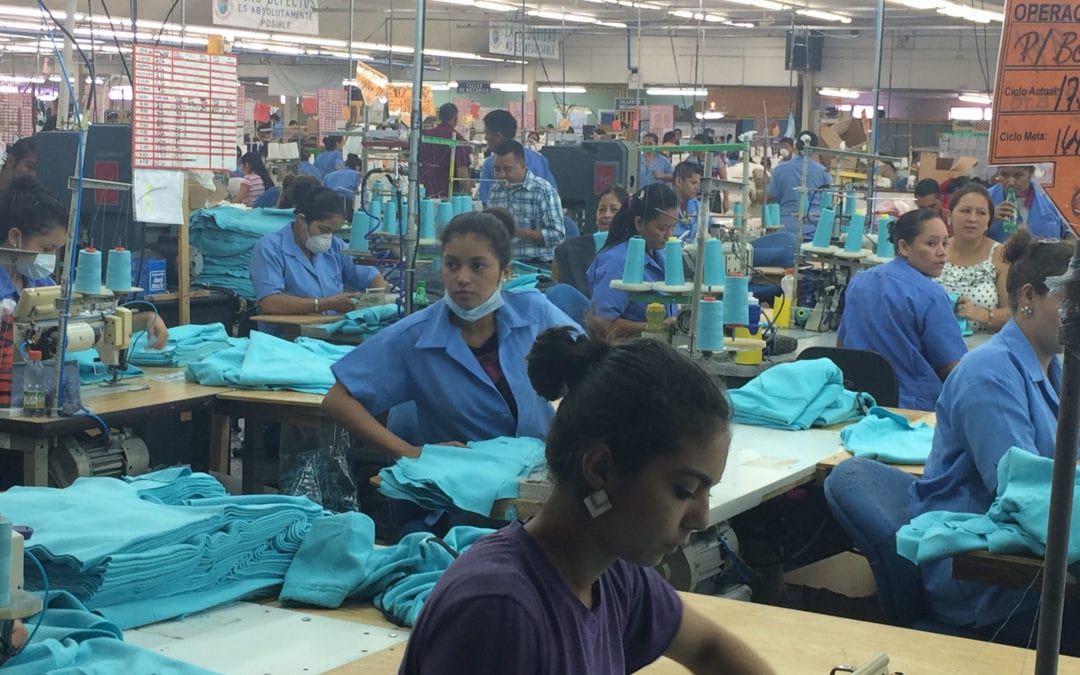
Jun 1, 2022
A powerful new report shows that collective bargaining changes work and workers’ lives for the better. According to the report, workers in Honduras with collective bargaining agreements are less likely to feel compelled to migrate or to face verbal abuse, and they earn more than workers without collective bargaining agreements. The Solidarity Center-supported report, “Bargaining for Decent Work and Beyond: Transforming Work and Lives Through Collective Bargaining Agreements in the Honduran Maquila Sector,” was published by the Center for Global Workers’ Rights.
“Collective bargaining ultimately is about transforming lives,” said Solidarity Center Executive Director Shawna Bader-Blau, who moderated a panel discussion launching the report. “Not only do better wages and working conditions result from collective bargaining, but workers report dignity and respect on the job for the first time through collective bargaining and unions.”
Report author Mark Anner, director of Pennsylvania State University Center for Global Workers’ Rights, highlighted some key findings of the report. He said:
- Workers covered by a collective bargaining agreement are 25.3 percent less likely to feel compelled to migrate than workers without a collective bargaining agreement.
- Honduran garment workers with a collective bargaining agreement are 67 percent more likely to always have the choice to work overtime or not.
- Workers not covered by a collective bargaining agreement are 20.3 percent more likely to face verbal abuse.
- Female workers without a collective bargaining agreement are 10.7 percent more likely to face sexual harassment on the job.
- Workers with collective bargaining agreements earn 7 percent more than workers without collective bargaining agreements.
“Workers experience tangible and intangible benefits from having collective bargaining agreements,” Anner said. He quoted some workers as saying, “We are listened to now” and “Management shows us respect as workers.”
The report documents the expansion of collective bargaining agreements in the maquila sector, following a 2009 binding agreement between workers and a garment manufacturer. As of last year, 50,625 workers, mostly in the garment industry, were covered by 21 collective bargaining agreements in the Honduran export assembly sector.
Bader-Blau emphasized that the report shows the importance of worker-driven research, as suggested by the Solidary Center. “Unions lead and show outcomes to the rest of the world through the power of their own stories,” she said.
Union leaders like Eva Argueta, a leader in organizing tens of thousands of garment workers in Honduras, led the process of connecting with workers to help them share their work experiences.
Speaking on the panel, Argueta, representative for the General Workers Central (CGT, Honduras) and Maquila Organizing Project coordinator, described the process. “The person responding is much more likely to trust someone that they know who is doing the survey,” she said. “It can be a delicate thing because of the fear the boss might find out.”
Worker-leaders interviewed a total of 387 workers with and without collective bargaining agreements.
Other panelists included Joel López, general secretary of the Independent Federation of Workers of Honduras (FITH), Tara Mathur, field director for the Americas at the Worker Rights Consortium (WRC), and María Elena Sabillón, Solidarity Center senior coordinator in Honduras.
As Sabillón shared in her remarks, “Collective bargaining agreements allow for real progress in both labor and human rights. CBAs today go beyond economic clauses. Unions are winning clauses on equality, combating violence and harassment in the world of work and respecting the dignity of each person. These CBAs are validating a broader rights-based approach.”



 Few migrant workers are covered by labor laws, and an overarching solution to the scourge of wage theft is for governments to provide migrant workers access to these fundamental protections—and that includes the ability to freely form unions, an internationally recognized right that most governments refuse to extend to migrant workers.
Few migrant workers are covered by labor laws, and an overarching solution to the scourge of wage theft is for governments to provide migrant workers access to these fundamental protections—and that includes the ability to freely form unions, an internationally recognized right that most governments refuse to extend to migrant workers.










